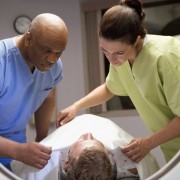The strengths of cardiac MRI as a diagnostic tool
Patients with certain heart conditions can significantly benefit from having an MRI, but multi-modality cardiac imaging tests are often required to obtain a comprehensive assessment of the heart

Cardiac MRI is a formidable instrument to examine the heart in order to spot potential dysfunctions.
“MRI for the heart is a very versatile imaging tool that allows the cardiologist to acquire moving images of the heart from different angles,” says Dr Teoh Jun Kiat, consultant cardiologist at Sunway Medical Centre in Kuala Lumpur.
He adds that MRI has the unique ability to capture the distinctive features of heart tissue. This information, in turn, is instrumental in diagnosing a range of conditions that in the past may be tricky to diagnose, such as myocarditis (inflammation of heart muscle), cardiomyopathy (a group of diseases that affects the heart muscles) and assessing the viability of heart muscles after a heart attack.
“Additionally, most patients with congenital heart disease require a cardiac MRI to obtain a comprehensive assessment of the heart defects and to evaluate the consequence of these defects on the rest of the heart.”
Multi-modality approach
Despite its advantages, cardiac MRI cannot offer an exhaustive picture of the patient’s cardiovascular health in every clinical scenario.
“Patients often require more than one test to obtain a comprehensive heart assessment,” according to Dr Teoh. “We call this multi-modality cardiovascular imaging.”
This boils down to the fact that each imaging test has its own advantages and drawbacks, according to Dr Teoh. Hence, the role of the cardiologist is to select the most appropriate imaging modality to meet the needs of each individual patient.
Coronary angiography, CT scan or exercise stress test are some of the other investigations that may complement cardiac MRI.
Coronary angiography and CT angiography, for instance, represent two reliable methods in anatomically as well as visually detecting coronary artery disease - a narrowing in the coronary arteries that may reduce blood supply to the heart and lead to chest pain. However, cardiac MRI can provide indirect information indicating the presence of coronary artery disease by demonstrating a lack of blood supply to the heart when the patient is subjected to stress during an MRI examination, says Dr Teoh.
He notes that an MRI can also guide treatment decisions for patients with coronary artery disease.
Once a narrowed artery is identified, the cardiologist may decide to perform an angioplasty – a procedure where a stent is inserted in the artery to widen it thereby restoring blood flow.
“It is important to note that blocked arteries should be opened only if the heart muscle is viable,” explains Dr Teoh. “There is no benefit in restoring blood flow to damaged muscles simply because damaged muscles will not regenerate.”
An MRI is able to show whether the heart muscle supplied by the narrowed artery is viable or irreversibly damaged. This will guide doctors in deciding if a patient with a blocked artery stand to benefit from angioplasty or coronary artery bypass surgery.
 Dr Teoh Jun Kiat is a consultant cardiologist at Sunway Medical Centre. He sub-specialises in multi-modality advanced cardiovascular imaging.
Dr Teoh Jun Kiat is a consultant cardiologist at Sunway Medical Centre. He sub-specialises in multi-modality advanced cardiovascular imaging.
Sunway Medical Centre
5, Jalan Lagoon Selatan, Bandar Sunway
46150 Petaling Jaya, Selangor, Malaysia
Tel: 603-7491 9191
sunwaymedical.com
Related Articles
Why laughter may not be the best medicine
Dr Julian K.B. Tan, an interventional cardiologist at Mount Elizabeth Hospital, explains the how strong emotions may affect the heart
Read moreWhat is a heart attack?
Dr Paul Chiam discusses the importance of seeking treatment quickly in the case of a heart attack
Read moreLatest Articles
Medical Care
Achieving Swift Recovery: Enhanced Recovery (ERAS) Direct Anterior Approach Total Hip Replacement
Consider total hip replacement with Alps Orthopaedic Centre's ERAS Direct Anterior Approach for faster recovery and reduced hospital stays. Learn about Dr. Jerry Chen's expertise in Singapore.
Read moreMedical Care
Enhanced Recovery (ERAS) Total Knee Replacement
Discover how Alps Orthopaedic Centre's Enhanced Recovery After Surgery (ERAS) approach transforms total knee replacement into a day surgery, offering faster recovery, less pain, and reduced hospital bills. Learn about Dr. Jerry Chen's expertise and schedule your appointment in Singapore.
Read moreMedical Care
Clinical Exercise Physiologist (CEP): The Emerging of Exercise is Medicine
How Exercising can be a Medicine
Read more